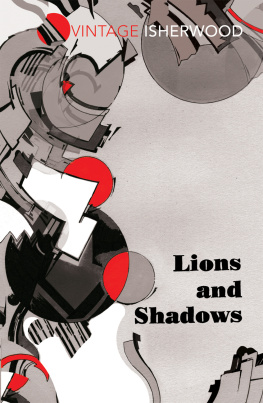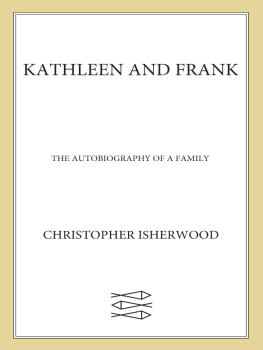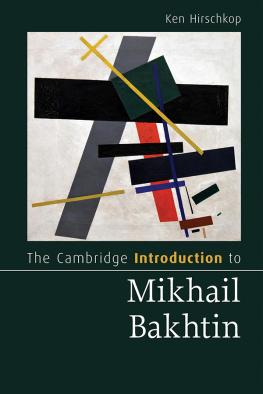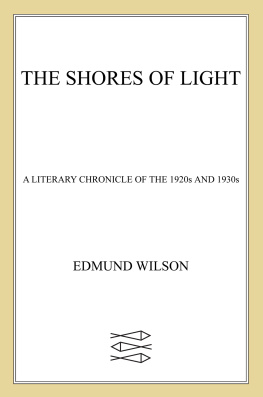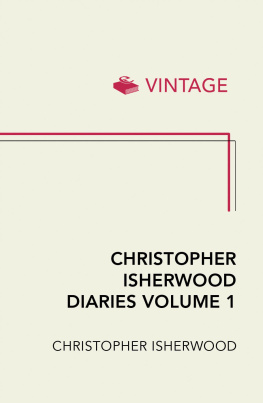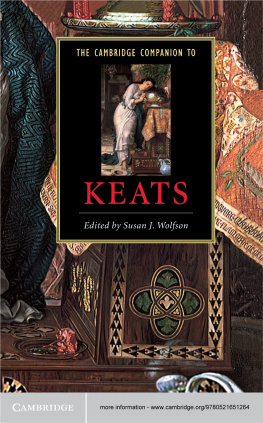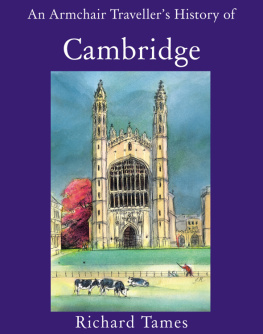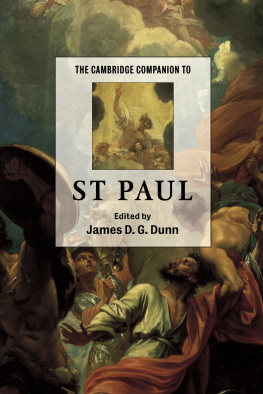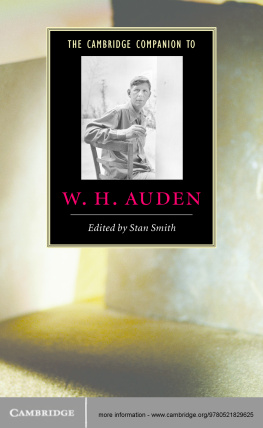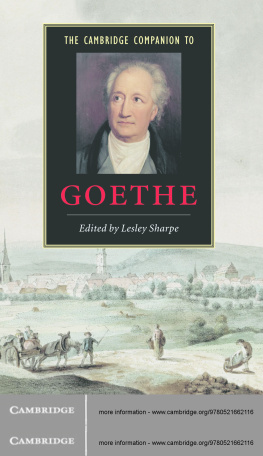Contents
About the Author
Christopher Isherwood was born in Cheshire in 1904. He began to write at university and later moved to Berlin, where he gave English lessons to support himself. He witnessed first hand the rise to power of Hitler and the Nazi party in Germany and some of his best works, such as Mr Norris Changes Trains and Goodbye to Berlin, draw on these experiences. He created the character of Sally Bowles, later made famous as the heroine of the musical Cabaret. Isherwood travelled with W. H. Auden to China in the late 1930s before going with him to America in 1939, which became his home for the rest of his life. He died on 4 January 1986.
ALSO BY CHRISTOPHER ISHERWOOD
All the Conspirators
The Memorial
Mr Norris Changes Trains
Goodbye to Berlin
Prater Violet
The Condor and the Cows
The World in the Evening
Down There on a Visit
A Single Man
A Meeting by the River
Kathleen and Frank
Christopher and his Kind
My Guru and his Disciple
With Don Bachardy
October
With W. H. Auden
The Dog Beneath the Skin
The Ascent of F6
On the Frontier
Journey to a War
CHRISTOPHER ISHERWOOD
Lions and Shadows
An Education in the Twenties
WITH A NEW INTRODUCTION BY
James Fenton
This ebook is copyright material and must not be copied, reproduced, transferred, distributed, leased, licensed or publicly performed or used in any way except as specifically permitted in writing by the publishers, as allowed under the terms and conditions under which it was purchased or as strictly permitted by applicable copyright law. Any unauthorized distribution or use of this text may be a direct infringement of the authors and publishers rights and those responsible may be liable in law accordingly.
Version 1.0
Epub ISBN 9781446476154
www.randomhouse.co.uk
Published by Vintage 2013
2 4 6 8 10 9 7 5 3 1
Copyright Christopher Isherwood 1938
Introduction copyright James Fenton 2013
Letter to Lord Byron and The Novelist
copyright 1937 and 1938 by W. H. Auden, renewed
Reprinted by kind permission of Curtis Brown Ltd.
First published in Great Britain by The Hogarth Press in 1938
Vintage
Random House, 20 Vauxhall Bridge Road,
London SW1V 2SA
www.vintage-books.co.uk
Addresses for companies within The Random House Group Limited can be found at: www.randomhouse.co.uk/offices.htm
The Random House Group Limited Reg. No. 954009
A CIP catalogue record for this book is available from the British Library
ISBN 9780099561224
Introduction
W. H. Auden, Christopher Isherwood, Stephen Spender, Louis MacNeice Auden was the first of his group to publish, in the fourth section of his Letter to Lord Byron, an autobiography of sorts. But a part of that impetus, he tells us, came from Isherwood:
So I sit down this fine September morning
To tell my story. Ive another reason.
Ive lately had a confidential warning
That Isherwood is publishing next season
A book about us all. I call that treason.
I must be quick if Im to get my oar in
Before his revelations bring the law in.
The Letter was finished by October 1936 and was published the following year, while Isherwoods account of An Education in the Twenties appeared in 1938. Neither author had, as yet, a large number of works to his name. Isherwood had two novels, for which he is hardly likely to be remembered (All the Conspirators and The Memorial), then his first abiding successes with Mr Norris Changes Trains and the story Sally Bowles. Goodbye to Berlin was still to be published.
So there was something cheeky about these two friends these two occasional lovers sitting down to write their accounts of how they came to be Poet and Novelist respectively. They seem to be laughing up their sleeves. Auden, for instance, in those lines, speaking of getting his oar in Before his [Isherwoods] revelations bring the law in, is making a jocular reference to the damaging things Isherwood could conceivably be going to say about their homosexual (and therefore illegal) activities a reference that the casual reader is unlikely to have picked up. One has to remember that, debonair though Audens tone is throughout the poem, he is writing only a generation after the trial and imprisonment of Oscar Wilde, who had died, a broken man, in 1900. The schoolmaster he mentions whose moral character was all at sea, or the one who had to leave abruptly in a taxi, could have been heading for the same kind of fate as Wilde: imprisonment and disgrace.
Of course, Isherwood was not about to spill the beans. Lions and Shadows is not a work of sexual revelation, except in those passages that recount the authors clearly insincere (and unconsummated) heterosexual exploits, or when Audens general attitude to sex is vaguely adumbrated. The book is, rather, what its author says it is, an account of the education of a novelist. And as such it has a gripping story to tell, for all its insouciance of tone. More than that, it contains memorable portrayals of Auden (Hugh Weston), Spender (Stephen Savage) and Edward Upward (Allen Chalmers) Upward who, though highly regarded by Isherwood and his circle, eventually allowed his novelistic talent to be placed under the supervision of the Communist Party, until the Communist Party, in 1948, seemed insufficiently Stalinist.
But Lions and Shadows is about the twenties rather than the thirties, and that engagement with Marxism and the party line was yet to come. Chalmers, in Lions and Shadows, is a rebel against what the school stands for, and what Cambridge stands for, and he is a rebel (of a comically uncertain kind) against the college Poshocracy the sport-loving, philistine set who hail from the better class of public school. He is a rebel not for any political reason, but because somehow, if you want to live the authentic life, rebellion is the way forward.
The attitude of the Repton sixth-formers, evoked in the first chapter, traces the roots of this irreverence to the fact that the Great War had just ended and the boys of the sixth had therefore just escaped conscription:
suddenly, the universal profession of soldiering was closed to them; and the alternatives seemed vague and dull. So the Sixth-formers let things drift and didnt much care. They regarded the school curriculum with benevolent amusement, broke bounds, ragged work and games, cut chapel, wrote daring love-poetry, strolled about the place in various forms of mild fancy dress or lolled round their study fires with their feet on the mantelpiece, smoking their pipes like grandfathers.
For those of us who attended the same school in later decades (in my case during the sixties), this short passage was profoundly fascinating. Repton in our day was always insisting on its traditions, yet here was a picture of its past life that had clearly been erased from the collective memory. So the boys had smoked pipes! And stuck their feet on the mantelpieces of their study fires! And cut chapel! It is a beguiling schedule of misdemeanours, ending with an account of a head-of-house listening, bored, to his housemaster droning on about house politics before, with the utmost sang-froid, falling asleep.
But this first chapter of Lions and Shadows is not a denunciation of the ethos of a school. It is a portrait of a teacher who, given the attitudes of the boys, finds a way of engaging them, amusing them and impressing them, and getting them to work to some purpose. Many people complained about their public schools and no doubt with good reason but among those who hated their experiences in such institutions overall, it is quite normal to find that an exception is made for a certain gifted or exceptionally dedicated individual on the staff. The literature of the British school has notable examples of the genre
Next page
